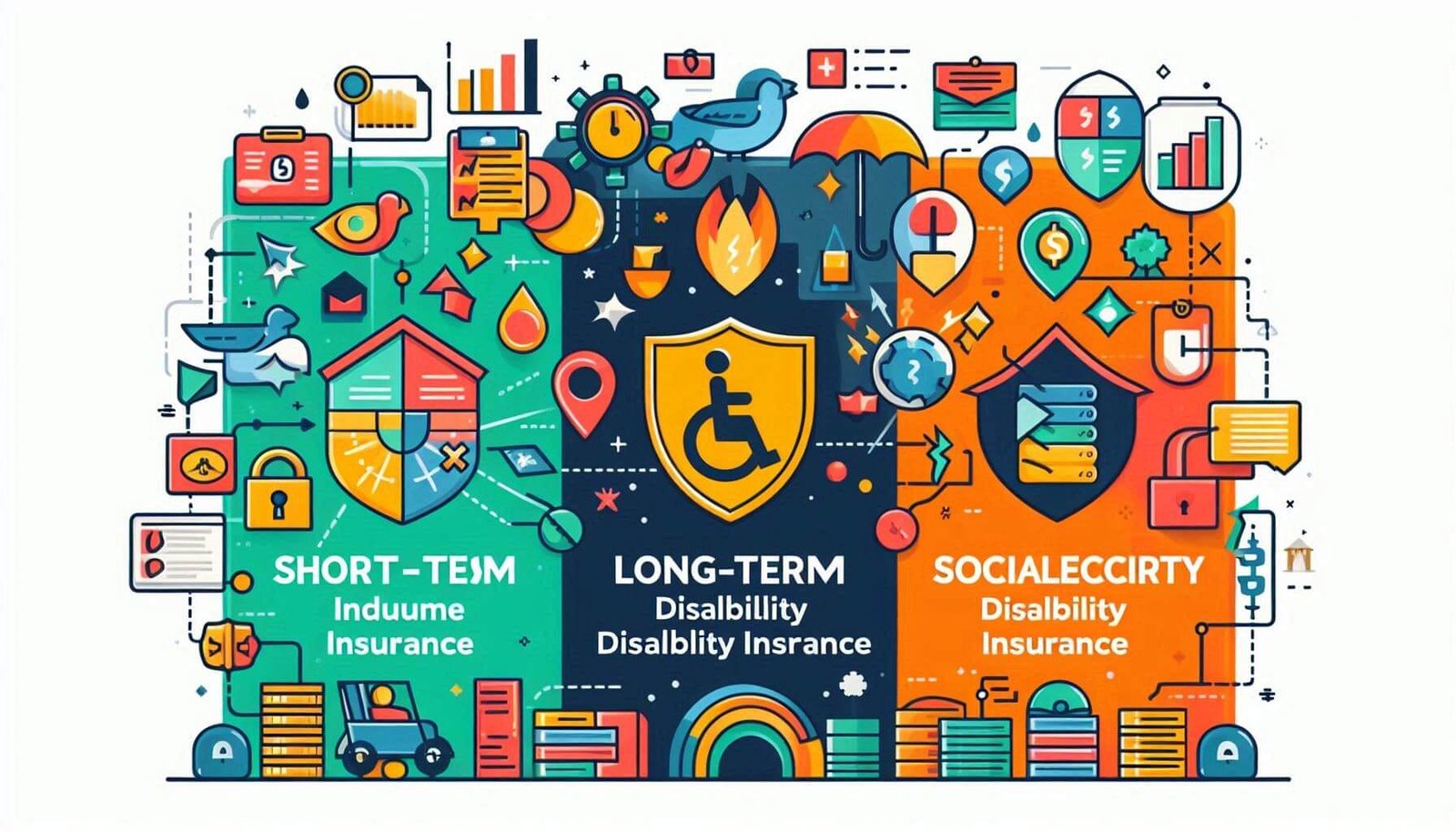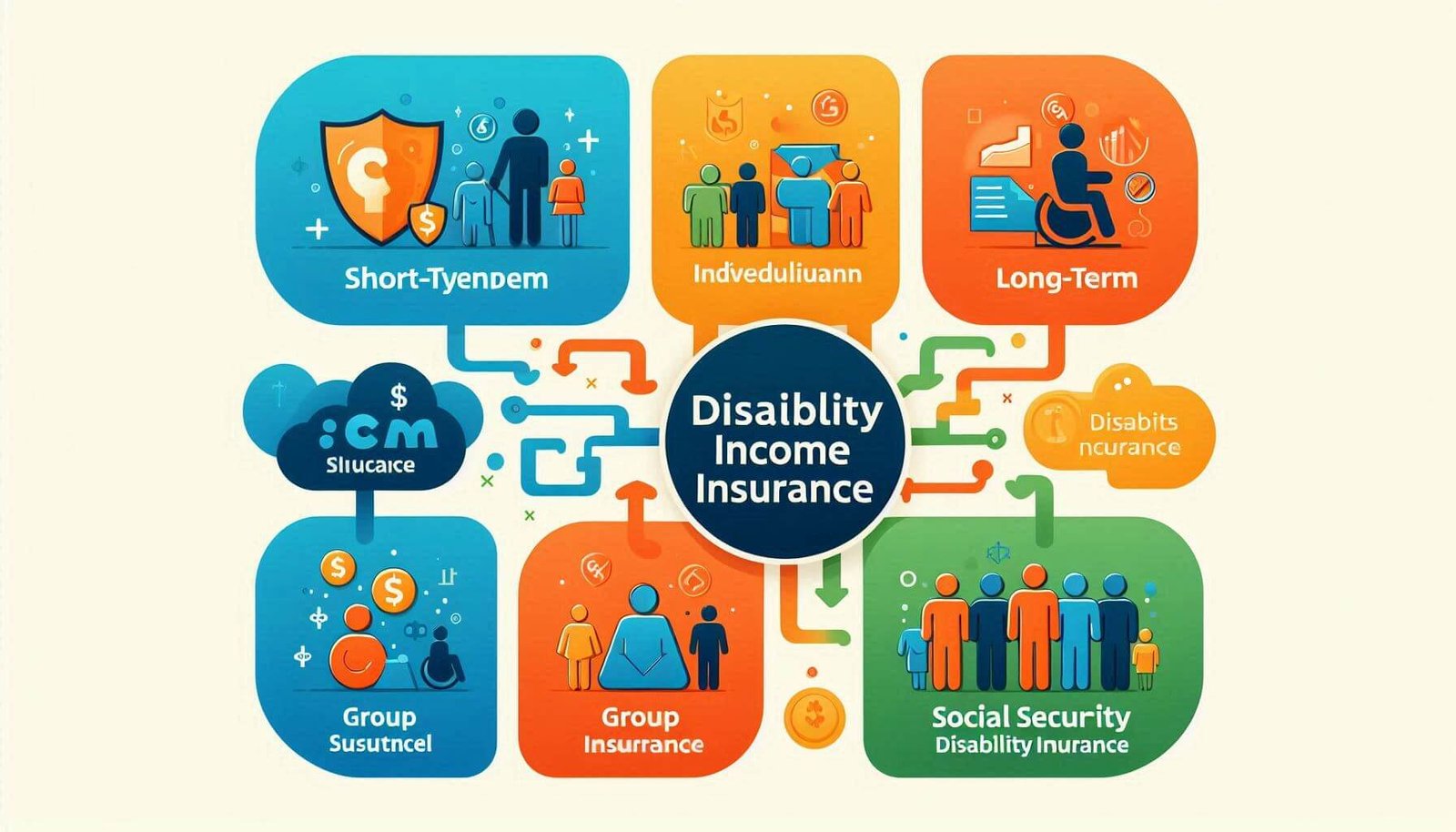In today’s unpredictable world, having a financial safety net is crucial. Disability income insurance (DI) provides just that, offering peace of mind in case an illness or injury prevents you from working. In this comprehensive guide, we will explore what disability income insurance is, how it works, its benefits, and why it’s essential for securing your financial future.
What is disability income insurance?
Disability income insurance is a type of insurance designed to replace a portion of your income if you become unable to work due to a disability. This coverage ensures that you continue to receive financial support even when you cannot perform your job duties.
Key Aspects:
- Income Replacement: It typically covers 50% to 70% of your pre-disability income.
- Types of disabilities: It can cover both short-term and long-term disabilities, depending on your policy.
- Tax Implications: Depending on how the premiums are paid, the benefits may be taxable.
How Does Disability Income Insurance Work?
Understanding how disability income insurance works involves knowing the policy’s specifics, including how benefits are calculated and paid.
- Premium Payments: You pay regular premiums to maintain your coverage. These can be monthly or annually, depending on the policy terms.
- Waiting Period: This is the time between when you become disabled and when benefits begin. This period is also known as the elimination period and can range from 30 days to several months.
- Benefit Period: This is the length of time you will receive benefits. It can vary from a few months to until you reach retirement age, depending on your policy.
- Definition of Disability: Policies may have different definitions of disability, such as “own occupation” (unable to perform your specific job) or “any occupation” (unable to perform any job).
Types of Disability Income Insurance

Disability income insurance policies can be broadly classified into two types:
Short-Term Disability Insurance
Short-term disability insurance provides coverage for a limited period, typically from a few weeks to up to a year. It is designed to bridge the gap for temporary disabilities that do not require long-term recovery.
Characteristics:
- Elimination Period: Usually shorter, ranging from a few days to a few weeks.
- Benefit Duration: Generally between 13 and 52 weeks.
- Coverage: Often used for conditions such as surgery recovery or short-term illnesses.
Long-Term Disability Insurance
Long-term disability insurance kicks in after short-term coverage ends, providing benefits for more extended periods, sometimes until retirement.
Characteristics:
- Elimination Period: Typically longer, ranging from 30 days to several months.
- Benefit Duration: Can continue for several years or until retirement age.
- Coverage: Often used for chronic conditions or serious injuries that prevent you from working long-term.
Key Features to Look For
When choosing a disability income insurance policy, consider these critical features:
Benefit Amount
The amount of income replacement you will receive should be sufficient to cover your essential expenses. Look for policies that provide a percentage of your pre-disability income, usually between 50% and 70%.
Elimination Period
Select a policy with an elimination period that aligns with your financial situation and needs. A shorter waiting period means you start receiving benefits sooner but may have higher premiums.
Benefit Period
Consider how long you need coverage. If you want long-term protection, choose a policy with a longer benefit period or until retirement.
Definition of Disability
Understand the policy’s definition of disability. “Own occupation” policies are more specific and may provide better coverage for professionals.
Cost of Living Adjustment (COLA)
Some policies include a COLA rider, which adjusts your benefits for inflation, ensuring that your income keeps pace with the cost of living.
Non-Cancellable and Guaranteed Renewable
Look for policies that are non-cancellable and guaranteed renewable, meaning your coverage cannot be canceled or altered as long as you continue to pay premiums.
Benefits of Disability Income Insurance

Disability income insurance offers several key benefits:
Financial Security
It provides a reliable income stream if you are unable to work, helping you meet your financial obligations and maintain your standard of living.
Peace of Mind
Knowing that you have coverage in place can reduce stress and anxiety about the financial impact of a disability.
Coverage for Various Conditions
It can cover a wide range of conditions, including accidents, illnesses, and chronic health issues, depending on your policy.
Protection for Your Family
If you are the primary breadwinner, disability income insurance helps protect your family’s financial well-being if you become disabled.
Common Misconceptions
There are several misconceptions about disability income insurance that can lead to misunderstandings:
“I don’t need it because I’m healthy.”
Disability can happen to anyone, regardless of their current health. Having insurance ensures you are prepared for unexpected events.
“My employer’s policy is enough.”
Employer-provided disability insurance may not provide adequate coverage or may be limited in duration. Personal policies can offer additional protection.
“It covers all types of disabilities.”
Policies vary in terms of coverage. It’s essential to review the policy details to understand what is covered and what is not.
Who Needs Disability Insurance?

Disability insurance is essential for anyone who relies on their income to cover daily expenses and maintain their standard of living. Who needs disability insurance? Simply put, anyone who is employed or self-employed should consider it.
This includes professionals, traders, and business owners who face the risk of becoming disabled due to illness or injury. Even if you’re in good health now, unexpected events can occur, and having disability insurance ensures that you have a financial safety net in place.
It’s particularly crucial for those who do not have substantial savings or other income sources to rely on during a period of disability. Protecting your income with disability insurance provides peace of mind and financial stability, making it a wise investment for anyone looking to secure their future.
How to Choose the Right Policy
Selecting the right disability income insurance policy involves careful consideration of your needs and options. Here are steps to help you make an informed decision:
- Assess Your Needs: Determine how much income replacement you need and the duration of coverage required.
- Compare Policies: Review different policies and their features, including premiums, benefit amounts, and exclusions.
- Consult an Expert: Speak with an insurance advisor to understand the nuances of different policies and find one that best fits your needs.
- Read the Fine Print: Carefully review the terms and conditions of the policy to ensure you understand what is covered and any limitations.
FAQs
Is disability income insurance the same as workers’ compensation?
No, disability income insurance is different from workers’ compensation. Workers’ compensation covers job-related injuries and illnesses, while disability income insurance provides coverage for disabilities that occur both on and off the job.
Can I have both short-term and long-term disability insurance?
Yes, many people opt for both short-term and long-term disability insurance to ensure comprehensive coverage for various scenarios.
How do I apply for disability income insurance?
You can apply through insurance companies, brokers, or online platforms. Be prepared to provide information about your health, occupation, and income.
Are disability benefits taxable?
It depends on how the premiums were paid. If your employer paid the premiums and did not deduct them from your taxable income, the benefits may be taxable.
Conclusion
Disability income insurance is a vital component of a robust financial plan. It provides critical protection against the loss of income due to disability, ensuring that you and your family are financially secure in times of need. By understanding how disability income insurance works, the different types available, and what features to look for, you can make an informed decision and select the best policy to meet your needs. Prioritize securing this coverage to safeguard your future and enjoy peace of mind knowing you have a safety net in place.

